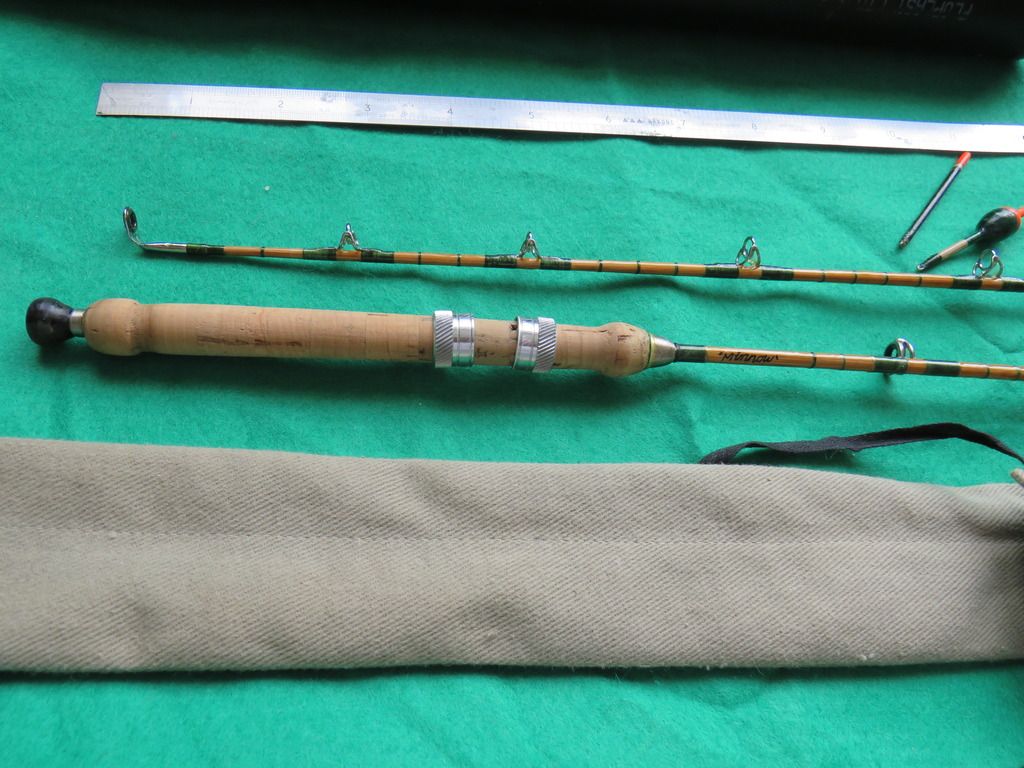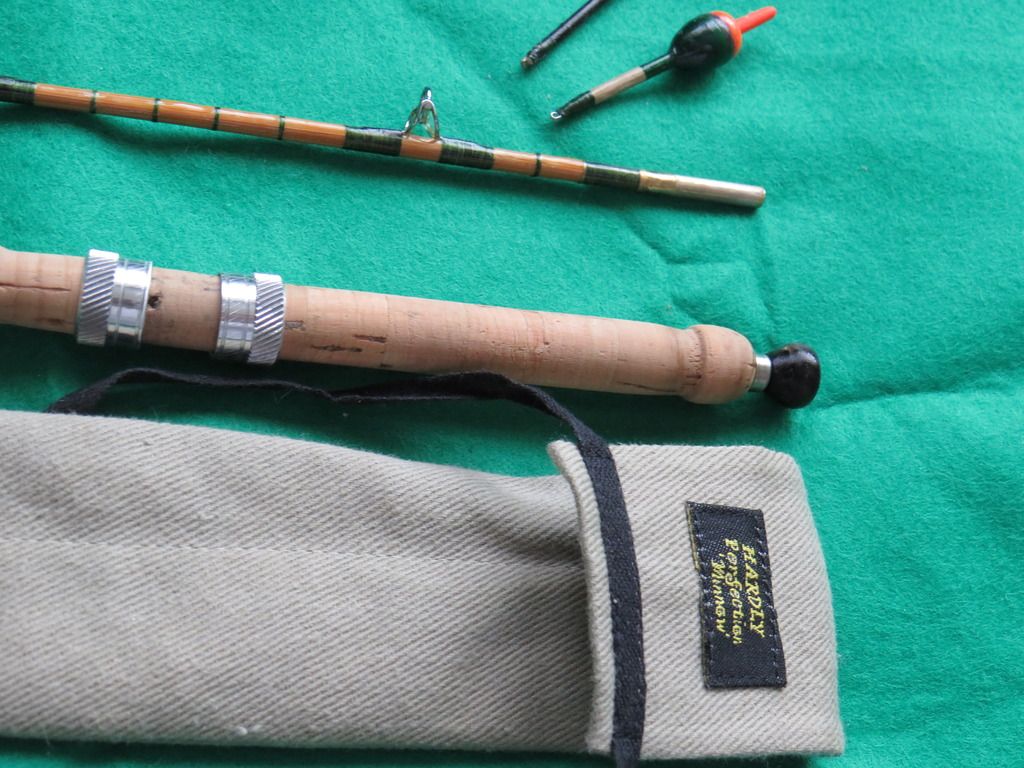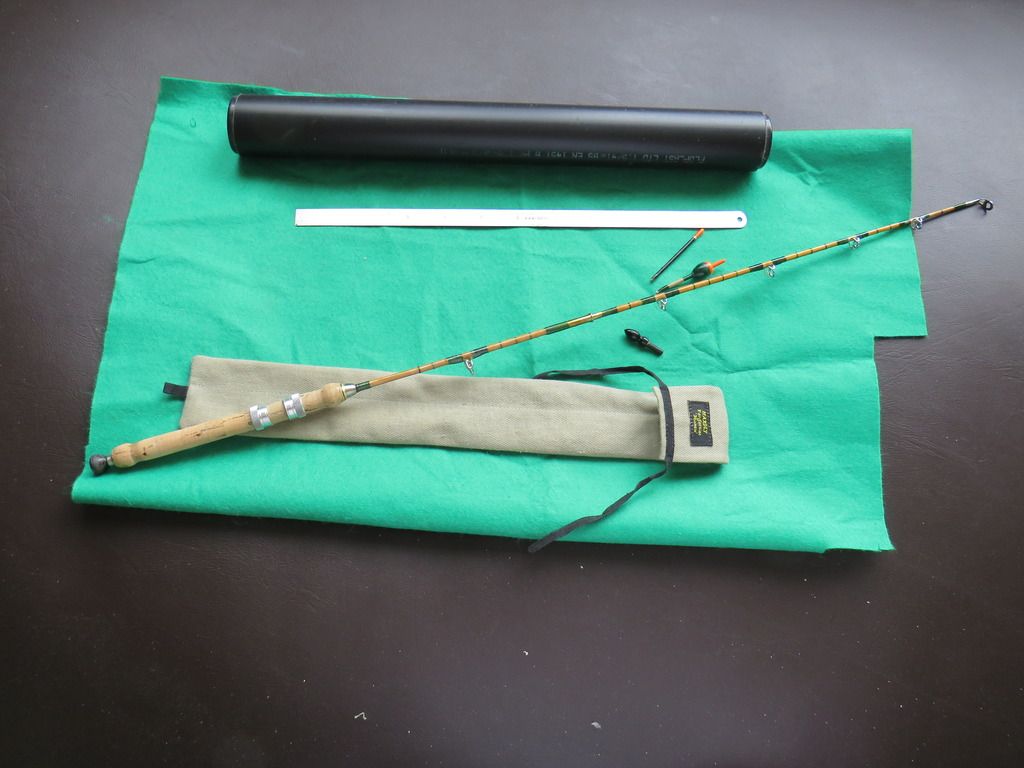Those first tentative steps...
| Richard Cleaver | 06/11/2016 13:19:20 |
15 forum posts | Hello to everyone here, admin, members etc. My name is Richard, I'm 48 and have been forced into medical retirement from driving buses which I did for 20 years. Since the forced increase in spare time, I try busying myself to keep the 'black dog' at bay. My hobbies are fishing, making fishing floats and fishing related bespoke items. I have very little metalwork experience but have acquired vast carpentry skills both with hand tools and lathe work. I have had to budget my expenses frugally now I receive just a pension and a medical allowance but am able to supplement my meagre income by selling bespoke fishing floats and tackle items. I've always been fascinated by things in miniature and have recently built a miniature split cane fishing rod complete with rod bag. I sent it to a friend that runs a vintage fishing company who was meant to value it for me and sell it on. Since receiving it, not only was he blown away by the quality and ingenuity of it but has suggested that I make more of them. A run of a dozen in fact, he would pay me for them in advance, in batches of three. That was a nice shock and I accepted gladly. With the advance I have purchased an Axminster CO lathe which will help me with creating floats but also the mini metal parts associated with the rod. One of the components I need to create is miniature reel bands. For the un initiated, these consist of two rings of aluminum that slide up and down the cork rod handle and affix a fishing reel by sliding over the reel seat trapping it in situ. These are moderately decorated and relatively easy to construct but present me with a problem. One end of these rings or bands is knurled on its face for finger grip. The first set I had, a friend was kind enough to make for me as I couldn't without a metalwork lathe. This was frustrating as I wasn't able to complete the build totally on my own. So now I have a micro lathe but the C0 lathe tool post only accepts 8mm tool shanks and the smallest knurling tool I can find has a 12.5mm shank. I have the lathe, the aluminum alloy tube ready to go but need a knurling tool to fit it desperately. Suggestions, advice and miracles welcomed. Long winded introduction but thanks for having me, listening and allowing me on board. Warm regards, Richard |
| Gray62 | 06/11/2016 14:17:42 |
| 1058 forum posts 16 photos | Richard, One of these may fit the bill, easy enough to replace the bar that fits into the toolpost with a suitable sized piece |
| Hacksaw | 06/11/2016 14:21:42 |
| 474 forum posts 202 photos | Make one from a flint fag lighter wheel? |
| Neil Wyatt | 06/11/2016 14:45:05 |
19226 forum posts 749 photos 86 articles | Hello Richard Hacksaw's suggestion works well for fine knurls. the holder doesn't need to be anything clever, just a bar with slot and a hole drilled through it for a spindle. Neil |
| Ian Welford | 06/11/2016 18:09:19 |
| 300 forum posts | Long winded I know but grind down the knurling tool shank to 8mm . Time intensive but a permanent solution |
| Richard Cleaver | 06/11/2016 18:55:29 |
15 forum posts | That's a great help chaps all good suggestions and I thank you. I will let you know how I get on and post some pictures when I've figured it all out. That's what I love about engineers, living life by two simple codes. 'Necessity is the mother of invention' and 'If it can't be fixed with gaffer tape...you're not using enough gaffer tape!'.
Well, what do you know...went for it and figured it out. Pics of miniature rod with knurled reel bands.
Thanks for your help. |
| Thor 🇳🇴 | 06/11/2016 19:29:50 |
1766 forum posts 46 photos | Hi Richard, Those fishing rods look very nice. Yes it may be difficult to find knurling tools with a small enough shank. RDG seems to have a knurling tool with 3/8" shank, less material to grind away than a 12.5mm. It is not easy to see from the photo on the RDG site but the piece clamped in the toolpost may just be bolted to the rest so you may be able to make a new part. Another alternative that may suit your needs is a hand knurler. Thor |
| Richard Cleaver | 06/11/2016 22:50:24 |
15 forum posts | Thanks Thor. I wasn't aware a hand knurler was suitable for metal working. The original maker has made contact on another forum with some advice which I will share here...
Have just had a more detailed look at the mini lathe you are buying..and without trying to put a damper on things in any way, may I advise you to be very careful in trying to knurl metal on this machine. Now, do not think that I am trying to be discouraging in any way, more than most strongly advising you to exercise great caution in using it. The reason is based on my rather limited experience in engineering, but I have learnt a few, hard and painfully expensive lessons along the way and one of them was in how to knurl metal successfully, so if you want to make a job of it, then listen to this and take it on board.
|
| Richard Cleaver | 06/11/2016 22:50:47 |
15 forum posts | Needless to say I'm left feeling a little apprehensive about spending more cash on a tool, defacing the shank and then putting my new lathe at risk as well. As I'm only going to be using aluminum tubing is this likely to decrease undue force on the tool rest? Should I perhaps settle for simplified design without knurling. I'm very confused.... |
| Frances IoM | 06/11/2016 23:14:17 |
| 1395 forum posts 30 photos | the two most common knurlers are (a) the single wheel that by pressure deforms the metal to form a knurl - here the sideways pressure is opposed by the headstock (b) a double wheel arrangement that uses a scissor like mechanism to apply pressure - there should be no sideways pressure on headstock but may need a reasonable amount of power but there is a third scheme as described by Jacques Maurel in ME 4543 + ME 4545 esp the 2nd instalment that cut a knurl rather than distort a knurl I suspect that this scheme could readily be used on the C0 especially with Aluminium |
| Michael Gilligan | 07/11/2016 03:09:41 |
23121 forum posts 1360 photos | Richard, Just a quick thought ... If straight knurling would be acceptable [& I don't really see why not] then you could plane the grooves with a single-point tool. This is a little time-consuming, but simple enough; and it only puts light loads on the lathe and workpiece. JasonB has previously posted some good explanatory photos. MichaelG. . Must try to get back to sleep now !! |
| Thor 🇳🇴 | 07/11/2016 04:30:33 |
1766 forum posts 46 photos | Hi Richard, I don't think that the RDG "scissor knurler" I referred to in my previous post will put un-natural strain on the lathe, especially since you are knurling aluminium, so I agree with Frances, this should work on a small lathe. Thor |
| Hopper | 07/11/2016 06:32:13 |
7881 forum posts 397 photos | YOu can also buy the knurling wheels from the usual model engineer suppliers and then make your own scissor type knurling tool to hold them, using whatever size shank you choose. Plenty of designs out there, going back to Duplex, Sparey, Radford and co. up to more modern times. Harold Hall has a good design and free drawings here **LINK** I shouldn't think that light knurling of the little aluminium rings you are doing would harm your lathe using such a tool. Force of one wheel balances out that of the other. Just be careful not to over strain the little electric motor at slow speed and burn it out, gently gently being the catch cry of all small lathes. |
| Richard Cleaver | 07/11/2016 08:50:31 |
15 forum posts | I am humbled by the informative help and suggestions offered and wish to convey my gratitude to you all. That being said, you must all understand that my ability and experience with working metal either in design, fabrication or otherwise, is far below rank of novice. Hence the title to this post. I am ashamed to admit that not only creating a two wheeled knurling tool to being beyond me, but also purchasing and altering a tool also. The lathe arrives today and it doesn't come with any tools. With my limited income, I'm fairly 'reined in' at the moment. I thought that sleeping on the problem might make it less daunting in the morning. Sadly it is not the case. Should any of you care to unburden me by making the rings.....drop your quotes in my inbox. Ha!
|
| Ian S C | 07/11/2016 09:05:26 |
7468 forum posts 230 photos | I'v got a little knurling tool that takes less than an hour to make, I found the idea in Stan Bray's book "Introducing the Lathe", and as Hacksaw says it has a flint wheel (from a Bic disposable lighter). Ian S C |
Please login to post a reply.
Want the latest issue of Model Engineer or Model Engineers' Workshop? Use our magazine locator links to find your nearest stockist!
Sign up to our newsletter and get a free digital issue.
You can unsubscribe at anytime. View our privacy policy at www.mortons.co.uk/privacy
- hemingway ball turner
04/07/2025 14:40:26 - *Oct 2023: FORUM MIGRATION TIMELINE*
05/10/2023 07:57:11 - Making ER11 collet chuck
05/10/2023 07:56:24 - What did you do today? 2023
05/10/2023 07:25:01 - Orrery
05/10/2023 06:00:41 - Wera hand-tools
05/10/2023 05:47:07 - New member
05/10/2023 04:40:11 - Problems with external pot on at1 vfd
05/10/2023 00:06:32 - Drain plug
04/10/2023 23:36:17 - digi phase converter for 10 machines.....
04/10/2023 23:13:48 - More Latest Posts...
- View All Topics
- Reeves** - Rebuilt Royal Scot by Martin Evans
by John Broughton
£300.00 - BRITANNIA 5" GAUGE James Perrier
by Jon Seabright 1
£2,500.00 - Drill Grinder - for restoration
by Nigel Graham 2
£0.00 - WARCO WM18 MILLING MACHINE
by Alex Chudley
£1,200.00 - MYFORD SUPER 7 LATHE
by Alex Chudley
£2,000.00 - More "For Sale" Ads...
- D1-3 backplate
by Michael Horley
Price Not Specified - fixed steady for a Colchester bantam mark1 800
by George Jervis
Price Not Specified - lbsc pansy
by JACK SIDEBOTHAM
Price Not Specified - Pratt Burnerd multifit chuck key.
by Tim Riome
Price Not Specified - BANDSAW BLADE WELDER
by HUGH
Price Not Specified - More "Wanted" Ads...
Do you want to contact the Model Engineer and Model Engineers' Workshop team?
You can contact us by phone, mail or email about the magazines including becoming a contributor, submitting reader's letters or making queries about articles. You can also get in touch about this website, advertising or other general issues.
Click THIS LINK for full contact details.
For subscription issues please see THIS LINK.
Model Engineer Magazine
- Percival Marshall
- M.E. History
- LittleLEC
- M.E. Clock
ME Workshop
- An Adcock
- & Shipley
- Horizontal
- Mill
Subscribe Now
- Great savings
- Delivered to your door
Pre-order your copy!
- Delivered to your doorstep!
- Free UK delivery!















 Register
Register Log-in
Log-in


